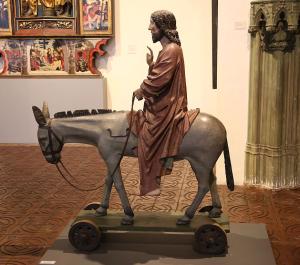
When Lazarus was raised from the dead, a crowd formed around Jesus. People thought that Jesus was about to establish his messianic credentials and assume the messianic throne. This is why they came to him. They wanted to be with him when he entered into Jerusalem because they wanted to witness what he was going to do to establish the messianic kingdom. In many respects, their expectations were correct; he truly was going to do what it took to bring about his messianic reign, but his reign was to be far different from anything they knew or understood:
The next day a great crowd who had come to the feast heard that Jesus was coming to Jerusalem. So they took branches of palm trees and went out to meet him, crying, “Hosanna! Blessed is he who comes in the name of the Lord, even the King of Israel!” And Jesus found a young ass and sat upon it; as it is written, “Fear not, daughter of Zion; behold, your king is coming, sitting on an ass’s colt!” His disciples did not understand this at first; but when Jesus was glorified, then they remembered that this had been written of him and had been done to him. The crowd that had been with him when he called Lazarus out of the tomb and raised him from the dead bore witness. The reason why the crowd went to meet him was that they heard he had done this sign (Jn. 12:12-18 RSV).
The crowd should have realized something different was going on than they expected when they saw his entrance into Jerusalem. What king comes into power on the back of an ass? There was something farcical about it all. The people should have seen that and realized that even if he were to fulfill their expectations and truly reveal his messianic power and authority, he was going to circumvent them, turning them upside-down and inside-out. He could not and would not be forced to act as they thought he should act. He was not going to take power and use it to destroy their earthly enemies. Instead of assuming earthly glory, he kept himself apart from it, so that though he could be shown doing exactly the same things as those who assume power do, he did so in a way to subvert those practices. For what Jesus was going to do is continue what was begun with the incarnation: he was going to establish the messianic kingdom by living out to the very self his kenosis, his self-emptying, so that not only would he die, he would descend into hell itself.
Jesus allowed himself to be seen as the messianic king; the people were right in celebrating his entrance into Jerusalem, for he was indeed about to establish his messianic authority. The people were hoping that Jesus was going to do something remarkable, something so awe-inspiring, that all the normal pomp and circumstances would be as nothing in comparison, which is why they could and would accept the way his entrance into Jerusalem differed from the way earthly kings were normally received when assuming power. They would get what they wanted; they would be shown a power and authority unlike any other, the power and authority over death itself, a power which would be revealed in his resurrection from the dead.
When Jesus did not meet the immediate expectations of the crowd, they were easily led to turn against him. This continues to this day. So many of us go to Jesus praising him, not because of any deep love for him, but because we think by doing do we can have him give us what we want. We believe him to be the messiah, and though we now understand that differently than those in the first century, we still place upon him various expectations which if he does not meet, will have us turn our back upon him. When we do this, we should examine ourselves. We should see that we are selfish, and our expectations are really demands which we make of him, demands which point to the fact we are looking out for ourselves instead of loving Jesus for who he is apart from all such expectations.
What has led us to be this way, so that instead of following Jesus out of love, we follow him solely for what we can get out of him? We should ponder this, and with what love we do have for him, allow ourselves to work on this problem, indeed, to counter it so that we cast aside all such things which divert us from that love. Then we can truly look to Jesus with the love which we should have and rejoice because we know that we are in the presence of our beloved:
Rejoice in the Lord always; again I will say, Rejoice. Let all men know your forbearance. The Lord is at hand. Have no anxiety about anything, but in everything by prayer and supplication with thanksgiving let your requests be made known to God. And the peace of God, which passes all understanding, will keep your hearts and your minds in Christ Jesus. Finally, brethren, whatever is true, whatever is honorable, whatever is just, whatever is pure, whatever is lovely, whatever is gracious, if there is any excellence, if there is anything worthy of praise, think about these things. What you have learned and received and heard and seen in me, do; and the God of peace will be with you (Philp. 4:4-9 RSV).
When we praise Jesus, when we rejoice in the Lord, when we speak to him and tell him all our desires, we must remember, Jesus is not to be treated as if he were some sort of genie; he wants to hear from us as a lover wants to hear from their beloved. Lovers speak to each other, revealing to each other their hearts, and with it, all their hopes and dreams. Doing so helps draw lovers together. Thus in our rejoicing, in our celebration, we will reveal our heart to Jesus, for that is what Jesus desires. Jesus wants us to be open and vulnerable to him so that we can then be open to him in his vulnerability, the vulnerability he has shown to us on the cross. We can and should be vulnerable together so that we can truly be open to each other and united with each other in real, unconditional love. And it is this which we need, this love, which will make our rejoicing, our celebration real and not just a matter of show or an attempt to gain some sway over Jesus. Alas, this love was not given to Jesus when he entered into Jerusalem, which is why many of them celebrated him one day before turning against him the next.
Stay in touch! Like A Little Bit of Nothing on Facebook.
If you liked what you read, please consider sharing it with your friends and family!













